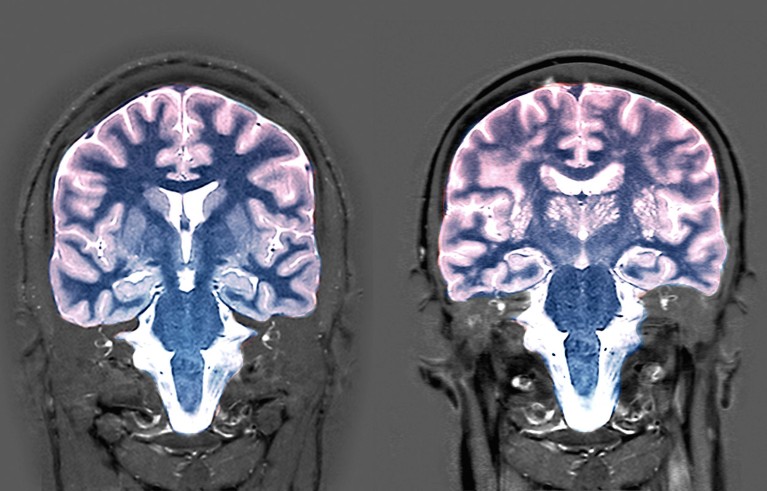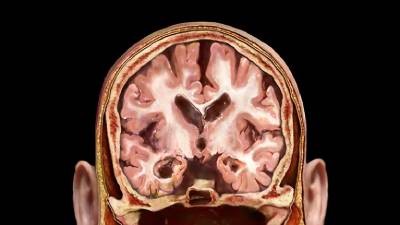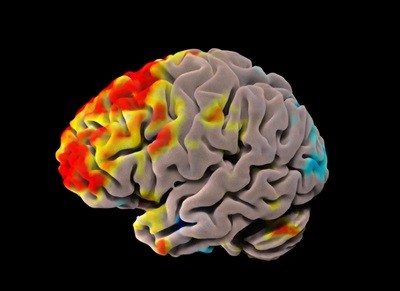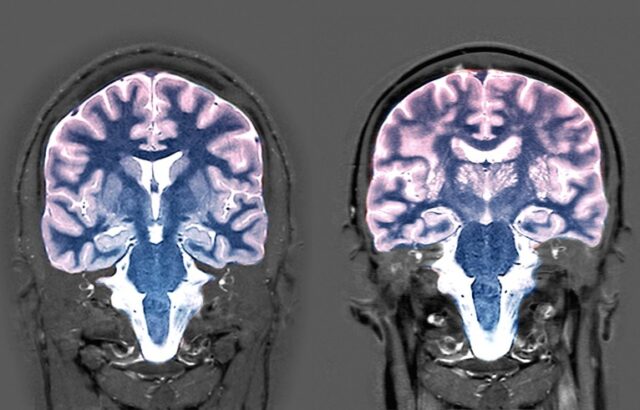
Magnetic resonance imaging scans showing the brain of a 25-year-old (left) and a 74-year-old (right).Credit: Zephyr/Science Photo Library
Researchers have identified 13 proteins in the blood that predict how quickly or slowly a person’s brain ages compared with the rest of their body.
Their study1, published in Nature Aging on 9 December, used a machine-learning model to estimate ‘brain ages’ from scans of more than 10,000 people. The authors then analysed thousands of scans alongside blood samples and found eight proteins that were associated with fast brain ageing, and five linked to slower brain ageing.

Dementia risk linked to blood-protein imbalance in middle age
“Previous studies mainly focused on the association between the proteins and the chronological age, that means the real age of the individual,” says study co-author Wei-Shi Liu, a neurologist at Fudan University in Shanghai, China.
However, studying biomarkers linked to a person’s brain age could help scientists to identify molecules to target in future treatments for age-related brain diseases. “These proteins are all promising therapeutic targets for brain disorders, but it may take a long time to validate them,” says Liu.
Brain age gap
Using machine learning to analyse brain-imaging data from 10,949 people, Liu and his colleagues created a model to calculate a person’s brain age, using hundreds of structural features such as the overall brain volume, thickness of the cortex and amount of white matter. The difference between the brain age and the chronological age, known as the brain age gap, can help to indicate brain health.
On average, the brain ages of participants differed from their chronological ages by around three years either way — meaning that most people had a brain that was biologically slightly ‘younger’ or ‘older’ than they were.
The researchers wanted to identify proteins that are associated with large brain age gaps, so they analysed the levels of 2,922 proteins in blood samples from 4,696 people, more than half of whom were female, and compared them with the same people’s brain ages according to their brain scans. They identified 13 proteins that seemed to be connected with large brain age gaps, some of which are known to be involved in movement, cognition and mental health.

What accelerates brain ageing? This AI ‘brain clock’ points to answers
One key protein was brevican (BCAN), which helps to form and maintain the network of molecules around cells and is involved in learning and memory. Higher levels of BCAN were associated with slower brain ageing. Brain cells in people with Alzheimer’s disease also express less BCAN than do those in healthy people.
In a separate analysis, the authors found that changes in levels of a range of blood proteins peak at three chronological ages: 57, 70 and 78 years, with each of these ages marking a distinct phase of brain ageing. For example, most of the changes at 57 years of age were in proteins associated with metabolism, wound healing and mental health. At 70 years old, proteins involved in brain-cell function showed changes that were strongly associated with risks of age-related brain conditions such as dementia and stroke. At the age of 78, the researchers observed changes in proteins linked to immunity and inflammation.
“These peaks have different implications” and can be used in early diagnosis and intervention for brain disorders, says Liu.
Mysterious mechanisms
The findings are preliminary, and further research is needed to confirm which of the proteins can act as biomarkers for brain ageing, says Anja Schneider, a neuroscientist at the German Center for Neurodegenerative Diseases in Bonn.
“One big question is: where are these proteins coming from?” says Mark Mattson, a neuroscientist at Johns Hopkins University in Baltimore, Maryland. He points out that in this particular study, the authors are “measuring blood levels of the proteins, but not brain levels”. Future studies in animal models should explore further how changes in the levels of the identified proteins could affect brain ageing, he adds.
Furthermore, most of the study participants were of European descent, and further studies are needed to investigate whether the findings translate to other populations, says Liu.






